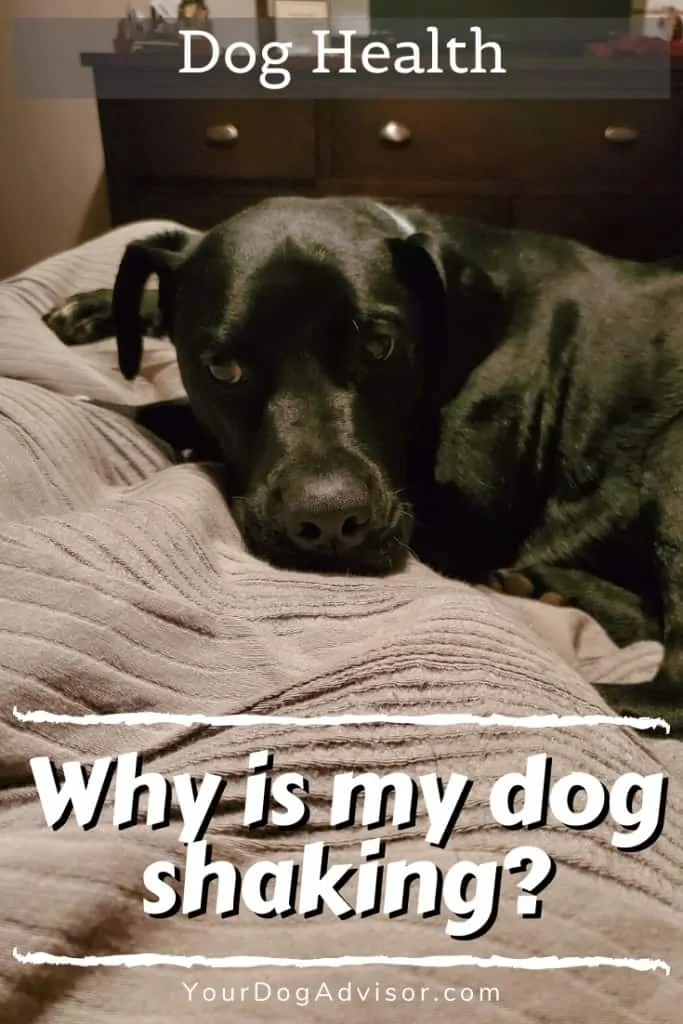Paying close attention to all of your dogs habits typically is a common occurrence by most dog owners. Whether it be your dog does something funny often with their body, or they bark at the same people over and over, dog owners often have habits to keep an eye on. One of those habits that may occur, and cause stress to owners is when their dog randomly shakes or twitches. I am here to go over Why your dog may shake.
The questions you may come across when shaking occurs might include: Why does the dog shake? Should I contact my vet immediately? What if it only occasionally happens? Let’s investigate the reasons and concerns:
Contents
Breeds and differences in Shaking
While most dogs shake due to some reason, there are those breeds that are more likely to “shake.” Certain dogs tend to have abnormalities near their spines, and cause excessive shaking. Those dogs include but are not limited to:
- Bernese Mountain Dogs
- Chow Chows
- English Springer Spaniels
- Rat Terriers
The signs of shaking are usually evident from birth all the way through puppy years, with some of the shaking going away as they mature and get older.
In my two dogs, I noticed that both tend to shake sometimes in their sleep, or to shake off their skin and fur. It appears that my Labrador shakes more so far than the Boxador, but that is because she is a touch older. Keeping an eye on all breeds of dogs for shaking and not specifying by a certain breed will help an owner on top of any habits.
Reasons Dogs Shake
Puppy Tremors
Both of my dogs have these from time to time when they are sleeping. Dogs have bad dreams too! Some of these dreams may have other reasons as well, but often “tremors” occur when they are deep asleep. A small huff, and a foot may start shaking during these tremors.
The tremors could be from a variety of reasons when the dog sleep, but research shows that there are certain approaches to do:
- Wake them Slowly: Jerking them around and yelling may have sleepwalking type effects on them. If you suddenly wake them up, you risk the chance of them biting or nipping at you.
- Play some calming music: Sometimes they just need to be reassured that they are safe. Playing some calming music may assist in this.
- Be nearby: Just being there for your dog on the bed or nearby will help them see when they do wake up that they are safe.
Research shows that this is normal, as long as it doesn’t occur all of the time.
However, another sleeping tremor may be more serious:
Ballistic Cardiogenic tremors are when dogs have abnormal cardiac contractions and blood flow within the heart, causing sporadic, involuntary movements of the body. This can happen when sleeping or awake. If the shaking occurs often, you may want to consult your vet to discuss your concerns.
Puppy tremors are quite common in sleep
They May just be cold
Do you keep your thermostat low? It might be time to increase the temperature just a touch during the day/night. While dogs have a strong layer of fur to keep them warmer, they still get cold. Increasing your thermostat a little bit might just make a huge difference.
On top of this, things like hard-wood floors, and moisture can be a few other reasons that dogs could be cold. Also, dogs get colds in general too! (Sneezing, energy drained, etc.) These are items that every day we do not necessarily consider, but if we take that extra step in our home for our dogs, it could make all of the difference.
Distemper
This can often occur and is more common in puppies or older dogs that may not have all of their vaccinations. Staying on top of your dogs shots and medicines is extremely crucial. Along with shaking, coughing and eye/ear discharge may be present during distemper.
Other symptoms of distemper may include high fever, labored breathing, vomiting and diarrhea, and potentially a loss of appetite. All of these items are quite scary when they are present, thus staying on top of your dogs health can be crucial in watching out for these symptoms.
Dogs Nauseous feelings can make them shake
Nausea
Dogs get stomach aches and nauseous just like humans. The act can be from certain medications, eating too fast or too much, or eating something they shouldn’t have.
On top of these nauseous causes, the shaking can occur with even more serious tems that make them nauseous, such as kidney or liver issues. Signs that something else is wrong may also be wrong include extra saliva, lip smacking and vomiting. These are more reasons why researching your dogs abnormal behavior and keeping in constant contact with your vet is mandatory.
Old age and more pain
Dogs tend to hurt a lot more as they get older. Some may even develop a shake or tremor in their legs. The dog is still mobile often, but when standing still, you may notice the shake increase in their older age.
While some say it is just “old age,” you still always want to make sure there isn’t more pain or issues with your dog, by consulting your vet regularly.
Puppies could ingest something that makes them shake
Poison or ingesting something
A lot of items can be poisonous to dogs. Your basic food items such as: chocolate, cigarettes, xylitol, are just a few items that can cause terror to your puppy.
Other poisons such as spider bites, or odd plants that may be poisonous will wreak havoc on your dog’s body.
Symptoms not only include shaking, vomiting, diarrhea and seizures possibly. An immediate call to your vet or local animal poison control should be initiated if any poisonous items are ingested.
Seizures or Brain Damage
A much more serious matter, dogs can have neurological problems that could end up being Seizures or brain damage.
Common signs of epilepsy may include:
- Collapsing: Not just plain exhausted, fall down and lay on the side collapsing. Serious collapsing may occur randomly when least expected.
- Jerking or stiffening of limbs: Random quick jolts of limbs often, or seeing your dog stiffen up may be a sign of epilepsy.
- Loss of consciousness and foaming at the mouth: The biggest sign is a random “pass out” symptom, with foaming and drooling at the mouth.
If any of these occur, get your dog to a vet immediately, and get medication prescribed.
Head Tremors
Two of the breeds that are at higher risk for head tremors include Bulldogs and Doberman Pinchers. The tremors could be random, and almost make it appear that they are agreeing or shaking their heads at you rapidly.
While this common in the two breeds, the bulldogs maturing shows that the tremors will go away eventually. Doberman’s are still prone to it most of their lives.
If your dog shows head tremor signs, make sure you do your research and contact your vet if the tremors do not decline or go away.
Puppies can shake from being excited
A Happy Shake
Not all shaking is a bad thing. The famous “wet dog shake,” can occur when the dog is wet from the weather outside, or has the feeling that they just need to shake off. The action is perfectly normal, and in my dogs, it occurs quite often.
Along with this, the “I’m excited” shake is very normal and common. A dog may be excited when someone gets home, or when they see someone grab a treat. Sometimes, happy jumping excited shakes can turn into hyper mode, in which they probably need to burn off some energy.
Overall
Dogs will most likely shake, but as long as the owner keeps an eye on the action, and makes sure it is not an unusual act, it can be treated as normal. Please feel free to comment below!

Jen Jones is a professional dog trainer and behavior specialist with more than 25 years of experience. As the founder of ‘Your Dog Advisor’ and the ‘Canine Connection’ rehabilitation center, she applies a holistic, empathetic approach, aiming to address root causes rather than merely treating symptoms.
Well known for her intuitive and compassionate approach, Jen adopts scientifically-proven, reward-based methods, encouraging positive reinforcement over punishment. Jen specializes in obedience training, behavior modification, and puppy socialization. Her innovative methods, particularly in addressing anxiety and aggression issues, have been widely recognized. Jen has worked with many of the world’s leading dog behaviorists and in her free time volunteers with local animal shelters and rescue groups.




